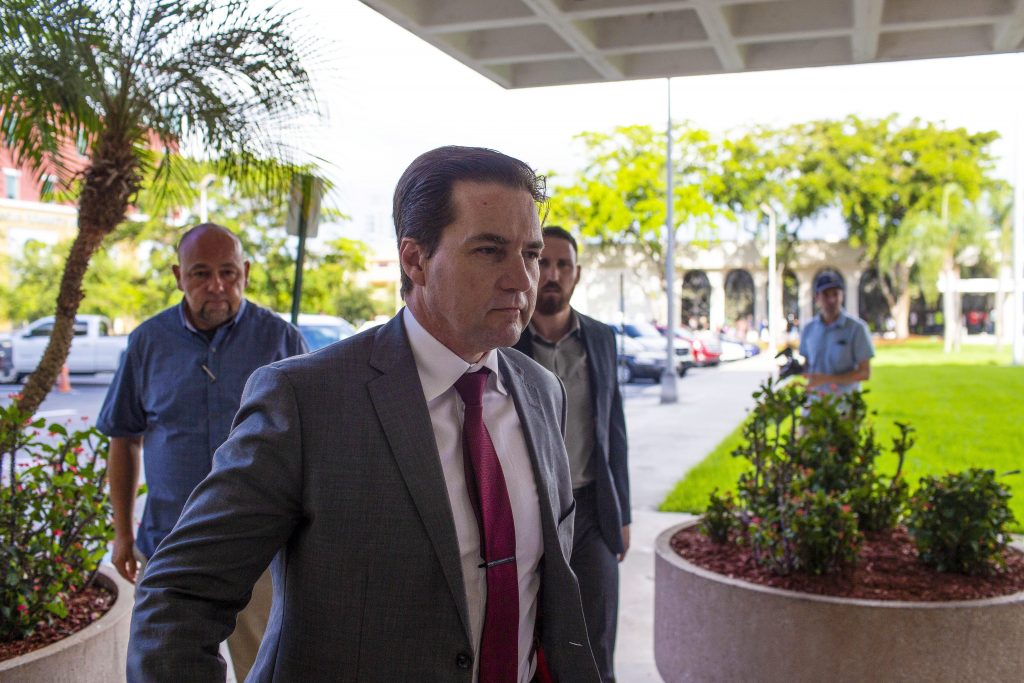Magistrate Judge Hits Australian Who Claims Credit for Bitcoin With Order to Pay Adversary's Attorney Fees
Federal Magistrate Judge Bruce Reinhart ordered Craig Wright to pay the estate of former cryptocurrency collaborator Dave Kleiman half of the bitcoin in his possession.
August 30, 2019 at 04:07 PM
5 minute read
 Craig Wright, self-declared inventor of bitcoin, arrives at federal court in West Palm Beach on Friday, June 28, 2019. Photographer: Saul Martinez/Bloomberg
Craig Wright, self-declared inventor of bitcoin, arrives at federal court in West Palm Beach on Friday, June 28, 2019. Photographer: Saul Martinez/Bloomberg
An Australian entrepreneur who claims to have created bitcoin has been ordered to pay the attorney fees of the brother of his late cryptocurrency collaborator.
Federal Magistrate Judge Bruce Reinhart ruled that computer engineer Craig Wright should be sanctioned after delivering false testimony and misleading the court in a lawsuit brought against him in the U.S. District Court for the Southern District of Florida by Ira Kleiman.
The magistrate judge's order issued earlier this week could force Wright to award more than $5 billion worth of bitcoin to the plaintiff.
The suit alleged Wright had more than $11.4 billion in bitcoin assets from his collaboration with Kleiman. This ruling orders him to relinquish half of intellectual property and the bitcoin he mined in their partnership.
Reinhart did not make a determination on Wright's claim that he created the cryptocurrency.
The plaintiff's brother Dave had worked with Wright to mine cryptocurrency prior to his 2013 death. Kleiman filed suit as the personal representative of his late brother in 2018, accusing Wright of unlawfully assuming control of billions of dollars worth of bitcoin and intellectual property.
The case drew keen interest from watchers of cryptocurrency as the allegations against Wright intertwined with his own claims of being Satoshi Nakamoto, the purported pioneer behind bitcoin. Spectators said the case had the potential to settle once and for all whether or not Wright truly was the elusive Nakamoto.
However, Reinhart said Wright had engaged in "a sustained and concerted effort to impede discovery into his bitcoin holdings" and repeatedly acted in bad faith before the court.
Read the order:
"The evidence establishes that [Wright] has engaged in a willful and bad faith pattern of obstructive behavior, including submitting incomplete or deceptive pleadings, filing a false declaration, knowingly producing a fraudulent trust document, and giving perjurious testimony at the evidentiary hearing," the judge said. "Dr. Wright's conduct has prevented plaintiffs from obtaining evidence that the court found relevant to plaintiffs' claim that Dr. Wright and David Kleiman formed a partnership to develop Bitcoin technology and to mine bitcoin."
The judge explicitly declined to declare whether or not the admitted evidence established Wright is Nakamoto as he claims to be. Although Reinhart also refused to make a determination on how much bitcoin Wright controls, he ordered the defendant to relinquish half of the intellectual property and bitcoins he'd produced prior to the death of the plaintiff's brother.
"Plaintiffs presently retain an ownership interest in the partnership's bitcoin, and any assets traceable to them," Reinhart said. The judge held that Kleiman could pursue attorney fees against Wright as a sanction for violating discovery orders. He declined to penalize the defendant's legal counsel.
Wright's attorneys with the Rivero Mestre law firm did not return requests for comment by press time.
Matthew Kohen, the co-chair of Carlton Fields' blockchain and digital currency practice, said the court demonstrated "sophistication" with its order in light of the convoluted nature of bitcoin's history and the case.
"As the court recognized there were some inconsistencies with Dr. Wright's testimonies," Kohen said, calling the saga surrounding Wright, Nakamoto and bitcoin's origins "movie-like."
 Carlton Fields attorney Matthew Kohen. Courtesy photo
Carlton Fields attorney Matthew Kohen. Courtesy photoKohen said, "This magistrate judge, who I'm sure had no prior interaction with bitcoin prior to this case, picked up on a lot of the same things bitcoin commentators picked up on, which I'm sure is not a coincidence."
Kleiman's legal counsel, Andrew Brenner of Boies Schiller Flexner and Roche Freedman partner Vel Freedman, expressed satisfaction with the decision in statements to the Daily Business Review.
"After giving all parties a full and fair opportunity to present evidence, the court issued a thorough and well-reasoned opinion,'' Brenner said.
"The Kleiman family has waited a long time to recover assets that should have been returned to it shortly after Dave's unfortunate death in 2013,'' Freedman said. He called the ruling "an important step in the right direction.''
Related stories:
'Scream These Facts': Miami-Dade Attorneys Trade Barbs in $11.4 Billion Bitcoin Lawsuit
Court Rules Bitcoin Qualifies as Money in Case of First Impression
Attorneys Assess Impact of Third DCA Ruling on Bitcoin Trading in South Florida
This content has been archived. It is available through our partners, LexisNexis® and Bloomberg Law.
To view this content, please continue to their sites.
Not a Lexis Subscriber?
Subscribe Now
Not a Bloomberg Law Subscriber?
Subscribe Now
NOT FOR REPRINT
© 2025 ALM Global, LLC, All Rights Reserved. Request academic re-use from www.copyright.com. All other uses, submit a request to [email protected]. For more information visit Asset & Logo Licensing.
You Might Like
View All
Plaintiffs Attorneys Awarded $113K on $1 Judgment in Noise Ordinance Dispute
4 minute read
US Judge Cannon Blocks DOJ From Releasing Final Report in Trump Documents Probe
3 minute read

Read the Document: DOJ Releases Ex-Special Counsel's Report Explaining Trump Prosecutions
3 minute readTrending Stories
Who Got The Work
J. Brugh Lower of Gibbons has entered an appearance for industrial equipment supplier Devco Corporation in a pending trademark infringement lawsuit. The suit, accusing the defendant of selling knock-off Graco products, was filed Dec. 18 in New Jersey District Court by Rivkin Radler on behalf of Graco Inc. and Graco Minnesota. The case, assigned to U.S. District Judge Zahid N. Quraishi, is 3:24-cv-11294, Graco Inc. et al v. Devco Corporation.
Who Got The Work
Rebecca Maller-Stein and Kent A. Yalowitz of Arnold & Porter Kaye Scholer have entered their appearances for Hanaco Venture Capital and its executives, Lior Prosor and David Frankel, in a pending securities lawsuit. The action, filed on Dec. 24 in New York Southern District Court by Zell, Aron & Co. on behalf of Goldeneye Advisors, accuses the defendants of negligently and fraudulently managing the plaintiff's $1 million investment. The case, assigned to U.S. District Judge Vernon S. Broderick, is 1:24-cv-09918, Goldeneye Advisors, LLC v. Hanaco Venture Capital, Ltd. et al.
Who Got The Work
Attorneys from A&O Shearman has stepped in as defense counsel for Toronto-Dominion Bank and other defendants in a pending securities class action. The suit, filed Dec. 11 in New York Southern District Court by Bleichmar Fonti & Auld, accuses the defendants of concealing the bank's 'pervasive' deficiencies in regards to its compliance with the Bank Secrecy Act and the quality of its anti-money laundering controls. The case, assigned to U.S. District Judge Arun Subramanian, is 1:24-cv-09445, Gonzalez v. The Toronto-Dominion Bank et al.
Who Got The Work
Crown Castle International, a Pennsylvania company providing shared communications infrastructure, has turned to Luke D. Wolf of Gordon Rees Scully Mansukhani to fend off a pending breach-of-contract lawsuit. The court action, filed Nov. 25 in Michigan Eastern District Court by Hooper Hathaway PC on behalf of The Town Residences LLC, accuses Crown Castle of failing to transfer approximately $30,000 in utility payments from T-Mobile in breach of a roof-top lease and assignment agreement. The case, assigned to U.S. District Judge Susan K. Declercq, is 2:24-cv-13131, The Town Residences LLC v. T-Mobile US, Inc. et al.
Who Got The Work
Wilfred P. Coronato and Daniel M. Schwartz of McCarter & English have stepped in as defense counsel to Electrolux Home Products Inc. in a pending product liability lawsuit. The court action, filed Nov. 26 in New York Eastern District Court by Poulos Lopiccolo PC and Nagel Rice LLP on behalf of David Stern, alleges that the defendant's refrigerators’ drawers and shelving repeatedly break and fall apart within months after purchase. The case, assigned to U.S. District Judge Joan M. Azrack, is 2:24-cv-08204, Stern v. Electrolux Home Products, Inc.
Featured Firms
Law Offices of Gary Martin Hays & Associates, P.C.
(470) 294-1674
Law Offices of Mark E. Salomone
(857) 444-6468
Smith & Hassler
(713) 739-1250






